"If your abusive parents were a great part of your life, your social circles may overlap. Word of your “needing space” will spread through your social circles. If your parents are particularly destructive, they may spread terrible rumors about you and do everything they can to convince mutual friends and relatives that you are mentally ill, that you are a liar, that you are somehow suffering a breakdown. Narcissistic parents will tear down their child to save themselves and their positive image"
Our segment a few days ago on emotional abuse continues with tips for the adult survivors of emotional abuse. Part of the outreach with Man in the Mirror PROJECT is to break down long seeded patterns within ourselves. Part of that process will be breaking down patterns in families. Many of us have no idea that we have been emotionally abused. Many of us "think" we have had "normal" childhoods, however still can't put a finger on why we feel so badly about ourselves.. This will be part of educating and healing yourself. Your part in healing will play a role in your children's lives as well. The more healing we do, the more it will affect our world.
Even if your goal is to meet your twin flame soul mate, this will have a direct effect on your efforts. These are part of the patterns that will keep you from your flame or compel you to come together. All relationships stem from our first relationship with our parents, but this isn't about them, as much as it is about us. Education is key. If you know the why's and how you have internalized what has happened in your life, you can begin healing and starting your life in a new way.
Some years ago, this happened to me. I was in an abusive relationship unable to leave for years. When the abuse started to affect my children on a physical level, I sought help. My parents only had to tell me that if I left the marriage, no one would want me. When I sought professional help, they said that if I decided to leave, I should know that I would no longer have a family. They were right. The moment I filed for divorce my mother began to spread rumors that I was having an affair. Then I heard it was because I was going through menopause at the ripe old age of 42. My aunt jumped in to save me only until my divorce was final. At that point she made contact with the only friends I had left as support and spread more lies about me, turning stories around to make it seem like I was the vindictive one.
When we go through these things with family members, sometimes we are shocked. Here, the people that are supposed to love you have not only abandon you, but have set you up to fail, and gone out of their way to make sure you do. They take joy in your agony. These are the emotional abusers. You don't want to believe it. For when you are young you have to believe they love you. It's your only survival mechanism. You have to, because they are the only ones you have to depend on for your livelihood. Unfortunately, when you grow older you then begin to think that "abuse" is love. It's not. And you may find yourself in unfulfilled relationships for the rest of your life until you know what it is that has affected you personally and how you can heal and move on from it..
Most of us don't think we need healing. Most of us would never consider going to counseling. I can assure you, however, that 99.9% of the people out there have some sort of abuse in their family. The cycle will continue unless you are brave enough to stop it for you and your children. So let's take a look at what tips there are for adults to heal from this and what the characteristics are of an abusive mother, father, spouse, etc.
Characteristics of emotional abuse
The weapons used for emotional child abuse don’t rely on strength and bulk; the abuser relies on words and emotional warfare.
Though emotional abuse does include outright screaming (called terrorizing), people who watch such movies or TV programs may think, “Oh, I yell at my kid sometimes. Who doesn’t?” What they fail to realize is that—unlike normal bursts of temper—emotional abuse is long-term… and the shouting is part of a long series of shouts.
Emotional abuse is systematic.“Psychological abuse of a child is a pattern of intentional verbal or behavioral actions or lack of actions that convey to a child the message that he or she is worthless, flawed, unloved, unwanted, endangered, or only of value to meet someone else’s needs.” (Samantha Gluck, Healthy Place: America’s Mental Health Channel article)
How emotionally abusive parents tear at the child’s sense of self varies. Here are some examples of the different types of emotional child abuse.
Giving the silent treatment.“No discussion of emotional abuse through words would be complete without including the absence of words as a form of abuse. This is commonly known as the “silent treatment.” Abusers punish their victims by refusing to speak to them or even acknowledge their presence. Through silence, the abusers loudly communicate their displeasure, anger, frustration, or disappointment.” (Dr. Gregory Jantz, “Portrait of an Emotional Abuser: The Silent Treatment Abuser” article)
Ranking children unnecessarily.
Being condescending. Abusive parents treat their children as if the kids are beneath them.
Bunny boiling. This type of abuse destroys something that the child cherishes.
Gaslighting children. Abusive parents will play mind games with their children. It involves saying or doing something then pretending it never happened or happened differently from how it really happened. “Gaslighting is a form of mental abuse in which false information is presented with the intent of making a victim doubt his or her own memory, perception and sanity.” (Theodore L. Dorpat,”Gaslighting, the Double Whammy, Interrogation, and Other Methods of Covert Control in Psychotherapy and Analysis“)
Scapegoating. “Scapegoating is a serious family dysfunctional problem with one member of the family or a social group being blamed for small things, picked on and constantly put down. In scapegoating, one of the authority figures has made a decision that somebody in the family has to be the bad guy. The mother or father makes one child bad and then looks for things (sometimes real, but most often imagined) that are wrong.” (Lynn Namaka, “Scapegoating“)
Often, the emotional child abuser will encourage, through his or her actions and treatment of the scapegoat, the other children to also pick on the scapegoat, so that the scapegoat has no allies in the family.
Sabotaging. An emotional child abuser will sabotage a child’s calm and peace. For example, if a child looks forward to a television program, at the last minute, the emotional child abuser may deliberately set forth a ridiculously long chore list to be done before the child can watch the show. (Think of the evil stepmother in “Cinderella,” who set up Cinderella to fail by giving her too long a list of items to do before the ball.) Or the father will deliberately schedule a family meeting at the same time that a child had planned ahead of time to attend a friend’s birthday party. Like all forms of emotional child abuse, sabotaging ruins a child’s sense of security.
Favoritism. The opposite side of scapegoating is favoritism. “Favoritism is the practice of systematically giving positive, preferential treatment to one child, subordinate or associate among a family or group of peers…. Favoritism becomes dysfunctional when actions and opportunities, resources and liberties are systematically denied or applied inequitably for no logical reason and without just cause.” (Out of the FOG)
An example of favoritism is when an emotional child abuser will let one child get a car ride to school with friends, but the other child must walk or ride a bicycle to school even though that child also was offered a ride by friends. Or one child has a completely different set of rules to adhere to while the other child has less or more relaxed rules.
Triangulation. An emotionally abuse parent will maintain a sense of power of his children by creating conflict between them. The children will be manipulated into conflicts with one another.
For example, a father will talk to Child A about Child B and say how he is upset with Child B because Child B said some terrible things about Child A. Child A will then be angry with Child B for both hurting her feelings and also for making the father sad. Child A and Child B will rarely discuss the incident because the parent has set up the children to distrust one another. Another example: a mother will vent her feelings about Child D to Child E, describing that child as taxing and irritating and whiny… then Child D will start viewing Child E in that light. Child D trusts the parent and will take her side. Meanwhile, the parent will talk to Child E about Child D.
Pathological (or compulsive) lying. “Compulsive Lying is a term used to describe lying frequently out of habit, without much regard for the consequences to others and without having an obvious motive to lie. A compulsive liar is someone who habitually lies.”
An emotional child abuser will often lie to his child. The lying will often go hand in hand with gaslighting, so that the parent will deny the lie. For example, a parent will tell a child, “If you get straight A’s this quarter, I will buy you an iPod Touch.” When the child gets straight A’s, the parent will deny the statement. “I never promised you an iPod Touch!” The combination of the lie and then the outright denial, if it’s habitual and consistent, will cause the child to begin to question his memory and, in some cases, sanity. The child becomes increasingly self-doubting.
Smearing. Smear campaigners carefully and strategically use lies, exaggerations, suspicions and false accusations to try destroying your credibility. They hide behind a cloak of upstanding heroism and feigned innocence in an attempt to make as many people as possible think their efforts are based not on their vindictiveness, but on upstanding concern.
Ignoring. Parents ignore the significant events in the child’s life. They ignore the child in general and refuse to discuss any interests or activities that the child may have. They seem bothered by the existence of the child. The abusive parent will cut short conversations, interrupt the child, mock the child for his/her interests, and treat the child as if she is a nuisance.
Corrupting. Parents teach the abused child to be a racist and bigot. They encourage violence and anger, and they advocate bullying. The parents reward the child for substance abuse or bigotry; promote illegal activities; and/or reward the child for such behaviors as lying, stealing, etc.
Terrorizing. This behavior is what people first think about when they think of emotional child abuse. Parents threaten the child verbally; they yell, scream, or curse. The parents swing from rage to warmth to rage, ridicule the child, and/or force the child to watch inhumane acts. The abusive parent keeps the child on edge, jumpy, nervous about meltdown.
Isolating. Parents leave the child unattended for very long periods of time. They keep the child away from family, friends, and peers, etc. They punish the child for engaging in normal activities and make the child become a misfit. They force the child to do excessive chores or excessive studying to keep them isolated. The child will not have the same opportunities as his or her peers to engage in social interactions but be forced to constantly sacrifice his childhood for the sake of the parents’ demands.
Tips for Adult Survivors
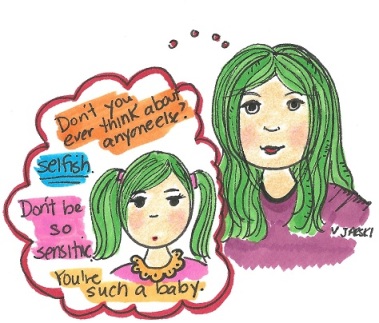 Note: The following are tips and ideas about healing from abuse but are simply suggestions. For direct advice and counseling, I highly recommend seeking professional help (You’ll be so glad you did.)
Note: The following are tips and ideas about healing from abuse but are simply suggestions. For direct advice and counseling, I highly recommend seeking professional help (You’ll be so glad you did.)
An emotionally abused child usually continues being emotionally abused by the parents long into adulthood. The patterns have already been established since the child’s earliest years. The dynamics of the family have been set into place. Nothing is to drastically change it—unless the child grown up awakens.
Some adults experience a jolt, a sudden flash of memory, that is triggered by an event, a song, a movie scene, anything, really. Others remain asleep until the abusive parents become abusive grandparents—continuing the cycle of emotional abuse to the adult survivor’s children. Others will just reach the point where they cannot take it anymore; enough is enough.
And the abused child-turned-adult awakens, slowly realizing that not everything is as it has seemed. Everything is different now.
Taking the red pill regarding your emotionally abusive childhood leads to a very difficult path—but the important thing is that it is a path. You no longer remain stuck, wondering about the pervasive depression or sorrow.
Best of all, you can break the cycle. You can heal. You can reclaim yourself.
Here are some suggestions as you begin your path to healing.
Create some distance between you and your abusive parent.
You will find it difficult to put your new thoughts in perspective if you are still immersed into your parents’ lives. So, you need to create some space. Let them know that you need time to think about things.
“Adult children who have never spiritually and emotionally separated from their parents often need time away. They have spent their whole lives embracing and keeping and have been afraid to refrain from embracing and to throw away from of their outgrown ways of relating. They need to spend some time building boundaries against the old ways and creating new ways of relating that for a while may feel alienating to their parents.” Boundaries: When to Say Yes, How to Say No and Take Control of Your Life”, pg. 38)
In some cases, adult children will find healing, and they will eventually find new ways of communicating with their parents that is healthy.
However, do note that in many cases, especially when dealing with narcissistic parents, your saying you need space will be seen as throwing down a gauntlet. In some extreme cases, narcissistic parents will sense that their adult child is beginning to awaken and the abuse will increase (and even get outrageous).
Don’t give up! Stay awake, stay vigilant. Give yourself space in which to think.
“You should not continue to set yourself up for hurt and disappointment. If you have been in an abusive relationship, you should wait until it is safe and until real patterns of change have been demonstrated before you go back.” (Boundaries book, pg. 38)
Again, in the case of narcissistic parents, they are never going to get it. You should talk to your therapist about that fact and about toxic relationships.
Take your time.
As you awaken, you will find yourself with all sorts of emotions rushing through you. Emotionally abused children usually do not have a great gamut of emotions, so many of these feelings will be uncomfortable, difficult to stand, inspire guilt. For example, you will feel anger towards your abusive parents—and then, you will feel guilt about thinking such terrible things about your parents. That’s natural. You’ve been set up your entire life to only think of your parents’ feelings and not your own… but that’s going to change. Take your time, explore different emotions, go to therapy regularly.
The adult child will have a hard time slowing down, at first. The child within them is used to jumping to serve the abusive parent and reacting quickly without thinking, for fear of punishment. But you no longer have to fear your abusive parent. Take your time. Take all the time you need… as long as you move away from the abuse and toward healing.
Educate yourself about emotional child abuse.
You’ll be going through myriad emotions, so you should read to better understand how healing is a process and will not happen overnight. You can find a starter’s recommending readings here.
In the book “Boundaries: When to Say Yes, How to Say No and Take Control of Your Life”by Dr. Henry Cloud and John Townsend, the clinical psychologists discuss the severe impact of being raised without boundaries and its affects into adulthood. Also, look at the various sites here for information about emotional child abuse and healing.
Be patient and loving with yourself.
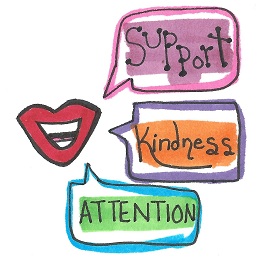
This merits repeating. Many adult children who awaken grow furious at themselves for having taken the abuse for so long. Be kind to yourself, however. The emotionally abused child that you were had no understanding that the abuse was not normal. The emotionally abused child was raised in emotional captivity—how could she or he know about anything else? View the fact that you have emerged from such captivity now as a miracle. Be grateful that you are awakening.
Surround yourself with good, supportive friends.
Humans are social creatures. We need others. We need community. The awakening to one’s abusive childhood can make the adult child feel like they have no one in the world… but they do. Turn to good friends (some friends may share their own similar stories). If you don’t have friends who can relate to you or offer the emotional support you need, consider online forums for help. (Just make sure the fit is right. You want healing and resources for healing with healthy doses of ranting—not constant nonstop ranting.)
“Fear of being alone keeps many in hurtful patterns for years. They are afraid that if they set boundaries, they will not have any love in their life. When they open themselves up to support from others, however, they find that the abusive person is not the only source of love in the world and that they can find the strength through their support system to set the limits they need to set… The other reason we need others is because we need new input and teaching.” (Boundaries book, pg. 39)
Understand you may lose friends and family members—but let them go.
When an adult survivor begins to process his abusive childhood, he will start becoming a different person, a more authentic self. The mask of “the perfect upbringing” or the “happy childhood” is stripped as the adult comes to understand that what happened in childhood was neither normal or healthy. Some people in the survivor’s life will have a huge problem accepting what is happening.
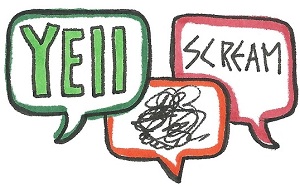
If your abusive parents were a great part of your life, your social circles may overlap. Word of your “needing space” will spread through your social circles. If your parents are particularly destructive, they may spread terrible rumors about you and do everything they can to convince mutual friends and relatives that you are mentally ill, that you are a liar, that you are somehow suffering a breakdown. Narcissistic parents will tear down their child to save themselves and their positive image; they will even claim to not know what is happening or why you are not happy in the relationship.
Know that, if your abusive parents are abusive in secret, most people will take their side. If your parents are charming and “pillars of the community,” you will find yourself alone in your truth.
Don’t cave in. Go to therapy. Educate yourself. Hold fast to the truth. Better to be alone in the truth than in the company of liars and their followers.
You may also find some of your closest friends not believing you and turning from you. They remember you as a happy person, always compliant, always talking about how wonderful your childhood was… They will have problems understanding that you were raised in a dictatorship, that you always used the wording that those in charge made you use, that you knew all the dictator’s slogans about being happy—and yet, deep inside, you were dying emotionally. Some friends may reject the hurting you because they do not want to either look at their own childhood, look at their own parenting, or look for a truly caring relationship.
Let the people walking away from you go. Let them go. True friends, good friends from the heart, will come and replace them in time.
“The problem with friends and family is that they know us as we are. They are invested in maintaining us as we are. The last thing we want is to remain as we are… With some exceptions (God bless them), friends and family are the enemy of this unmanifested you, this unborn self, this future being. Prepare yourself to make new friends. They will appear, trust me.” (author Steven Pressfield, “Do the Work“)
Remaining steadfast in your pursuit of an authentic life will be difficult—but you will not regret it. Your heart will hurt. You will feel sad. But you will also feel a deep sense of empowerment and self-respect—new feelings to the abused child.
Keep a journal.
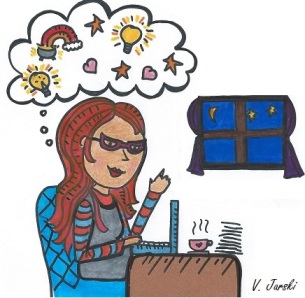 Write down what you are going through. Don’t stress about proper grammar, punctuation, etc. Just write whatever you feel. Get it out. Like Winston Smith in George Orwell’s novel “Nineteen Eighty-Four,” you must write your true feelings.
Write down what you are going through. Don’t stress about proper grammar, punctuation, etc. Just write whatever you feel. Get it out. Like Winston Smith in George Orwell’s novel “Nineteen Eighty-Four,” you must write your true feelings.
Write about…
- Memories that come up (Don’t edit yourself. Let it all out.)
- What pisses you off and what pissed you off (Your journal will never tell you to stop ranting. It will never tell you to just let it go.)
- What is happening in your relationship with your abusive parents.
- Good advice that you may have received.
- Epiphanies that you may have had
- Whatever you want to write about
- Quotes that inspire you.
- Your side of arguments.
Don’t forget that you can also use the journal to draw your thoughts, sketch things, and even clip out magazine articles and glue them on pages.
The journal will prove a worthy companion on your road to healing. It will show you the places you’ve been and the progress that you have made.
Be mindful of your relationships.
In awakening, the adult child may realize that many of his/her relationships mirror the same destructive pattern as the one they have with their parents. The adult child, not knowing any better, may have friends who treat them with the same abusive language and attitude that they have had in their youth. If you come to this realization, again, be gentle with yourself. You didn’t know. In captivity, you made friends with captors of different sizes and colors and shapes. But now, you can change this. You can choose your relationships.
Pray or meditate.
Praying to a higher power can help you focus on the ultimate relationship. It also helps you reach beyond yourself, beyond the human relationships, to find the love that does not fail. However, some abused children have had their religious faith or beliefs used against them by their abusers. Know that the abuse comes from people, not God. Talk to your priest, minister, rabbi, etc. to discuss your conflicted feelings. It’s all right.
Let yourself receive love.
If you have a good circle of friends, if you have a spouse who understands what is happening, let yourself receive that love, support, and understanding. The adult survivor can find it hard to be loved. (“How can anyone love me if my own parents didn’t?”) But know that your parents’ failure to love you is a failure in them—not you. You are lovable.
Accept change.
Your life will change in both enormous and very tiny ways once you awaken to the truth. Holidays, Sunday dinners, etc., will be different once you have distanced yourself from your abusive parents. At first, you will feel a crippling loneliness… but then remember the truth of how those holidays or dinners were. You may have had some beautiful moments in your relationship with your abusive parents—but be honest with yourself. How many good moments did you really have? How wonderful were those events really?
You now have the opportunity to make your own traditions for holidays and events and Sunday dinners. You no longer have to abide by rules and decrees put into place by your abusive parents.
You get to be the adult. Embrace that fact.
Find a creative outlet.
Take up running, knitting, drawing, sailing, sewing, woodworking—anything. Your mind and heart will be going into overdrive as you awaken. You need to find something that can be a healthy balm on your frayed nerves and fragile heart.
Don’t give up.
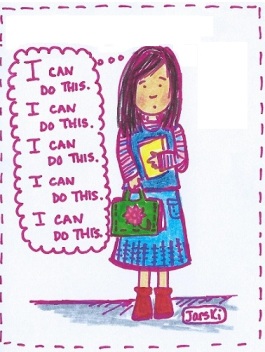 Don’t give up. Don’t quit. Rest, sure. Take a little time to just lose yourself in music or TV or books for a little while… then continue on. DON’T QUIT. Don’t stop on your path to healing. Sometimes, the sorrow will be biting and cold—but don’t quit.
Don’t give up. Don’t quit. Rest, sure. Take a little time to just lose yourself in music or TV or books for a little while… then continue on. DON’T QUIT. Don’t stop on your path to healing. Sometimes, the sorrow will be biting and cold—but don’t quit.
Know you are worthy of love, of respect, of kindness, of happiness, of dignity.
Know you matter.
Know that your life does make a difference
source: The Invisible Scar
http://theinvisiblescar.wordpress.com/suggestions-for-adult-survivors/
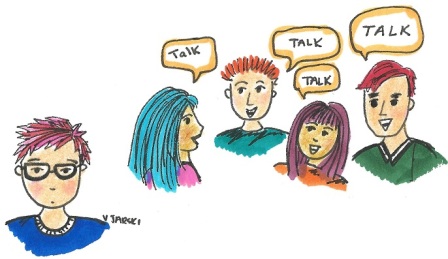
5 comments:
Thank you for this – for me, an uncannily timely piece. If your last blog struck a chord, this one just about played out the entire tune. I am learning to piece my authentic self back together after years of systematic abuse at the the hands of people I assumed (because they are family) loved me, I now realize, in the case of some, that they don't even like me. They didn't like me when I bent myself like a pretzel trying to be what they wanted/to keep them comfortable and they like me even less now that I have stopped doing that and begun expressing how I really feel. Coming to that realization and changing the pattern to where I begin to love and nurture myself has been much much harder than I thought it would be.
I have dealt with gaslighters and minimizers, liars and people who try and make you complicit in their abuse of you all my life. I can relate to the guilt/anger cycle and it is hard because I continue to believe that you can love people better and I don't want to become hard or cynical and bitter. I've realized that it is possible to forgive and choose not to be in a relationship with someone if they are unwilling to be honest, even if they are family. I've read the Boundaries book and it is excellent.
What I have had to accept is that, yes, these family members do need love in order to heal but that they don't want it from me, and may never do so. For my part, I can no longer hide who I am to make them feel better. It's debilitating and it no longer serves me to shrink myself to fit other people's boxes. I've been on this journey for five years, since my 'awakening' and I want to encourage anyone on a similar path that you owe it to yourself to be yourself – the person God created you to be, no matter what. Push through the pain and the fear and keep going. Life is change. Embrace the adventure. (cont)
I guess this phase I'm experiencing now is another 'healing crisis' so I'm flowing with it, soothed by the knowledge that it will pass. I no longer wrestle with internal panic and fear that there must be something terribly wrong with me, because why do certain family members think it is okay to behave so badly and that I am wrong if I refuse to accept it. It's not always parents. It can be siblings, grandparents, cousins, aunts, uncles, in laws, partners. I've learned that family does not have to mean 'biological family'. Family should be a safe, accepting, healing and loving space for all its members and if you are given that gift outside of your biological family, accept and embrace it without guilt.
A memory came back to me a couple of weeks ago of a conversation I had with my ex sister in law, in which she was telling me all the reasons why I wasn't good enough for her brother. I was listening to her at the time and thinking, "okay, I'll try and do better. Okay, I'll change that. Okay. Okay Okay." Not once did I challenge her or question whether what she was saying had any merit. I had been so conditioned into believing I was unworthy of love and had to earn it by jumping through (ever moving) hoops that I apologized to her and vowed to do whatever it took to be/do better.
So this memory comes back to me recently and my healed self can see how jealous this woman was of me and how hurt, damaged and bitter she was – but as I replayed the conversation this voice came into my heart which said "she is nothing but a mean-spirited bully. Don't believe any of what she says." Guess what – I burst out laughing, right there and then! It was surreal. If you had asked me before that moment, "have you ever been bullied?" I would have said "no". You see, when these things become our normal, you are right, we don't often see/understand what is going on. I think the shock of the realization plus the recognition of how much I have healed since then just caused me to burst into a fit of giggles. That was very healing! :-)
I can't begin to express how healing Michael's life and journey – what I have seen and understood of it – has been for me. I've lost count of the things I have learned from him. Strange to say, perhaps, about someone you never met, but nonetheless true. I'm grateful.
Thank you for the insightful post.
X
First of all I am sorry for your pain. I apologize for the treatment that other human beings have put you through. I am here for you.
I think we all need to hear that. Thank you so much for sharing your story. It helps us to heal when we share and it helps others not feel alone - thats what this is about.
I do feel that Michael (Jackson) touched so many peoples lives because we knew the pain that he too felt. He was not only in pain, but he was so willingly looking for love in the world. All of us look for the same. The unconditional kind you expect from a parent, from family. It's easy to connect with love and was easy for so many to connect with him because of it. He still,I believe, has much to teach us now and from his legacy. Thank you for your kind words about him.
As far as your family, ex's family; you can't and never will change them, don't try. As loving as it seems it will only be harder for you. There are some books about codependency that you might want to look into by Melodie Beattie if you haven't already. Also, I too understand about wanting to love your family. It's like loving your enemies. The key is to love who they really are - divine beings; You do not have to love the way they act. You are right in keeping your own boundaries for your sacred self in place and in peace. Keep going, keep strong, and keep an open heart without fear of hurt or shame. God made you that way. Don't let anyone ever tell you you are anything less.
Congratulations by the way. Doing what you did is not easy. But you DID do it :) xxoo
Thank you for your response – you are very kind. I recognize that a lot of that kindness comes from you healing as well from the hurtful things done to you and I too, am sorry for the pain and abuse you, or anyone reading this has suffered at the hands of others.
It is possible to heal. I know this for sure and have experienced it and so I know it is real. A key I have discovered is patience with and compassion for ourselves as we seek love and truth, both of which, I believe, are inseparable from God. Healing comes when we walk in love and truth in all things. It's a journey, and not a sprint at that. Even when you get an amazing epiphany or awakening about something relevant to you and your healing, causing many things to 'suddenly' fall into place, understand too that that in itself is a new beginning – of learning to practise the the new idea or action you have learned. Be gentle and loving and kind to yourself as you travel. It won't all happen overnight. But it IS happening, and the day will come when folk press those old pain buttons and it just doesn't hurt any more. You are healed.
I have read Melody's book and am way, way better than I used to be. The lessons I get from Michael's life continue to challenge and inspire and each one to me feels like a divinely wrapped present. It's very special.
Sending out love and heartfelt hugs to all who are hurting today and in need of some nurturing. You are loved.
X
Fab! Once again thank you for sharing and spreading the love. xxoo
Post a Comment